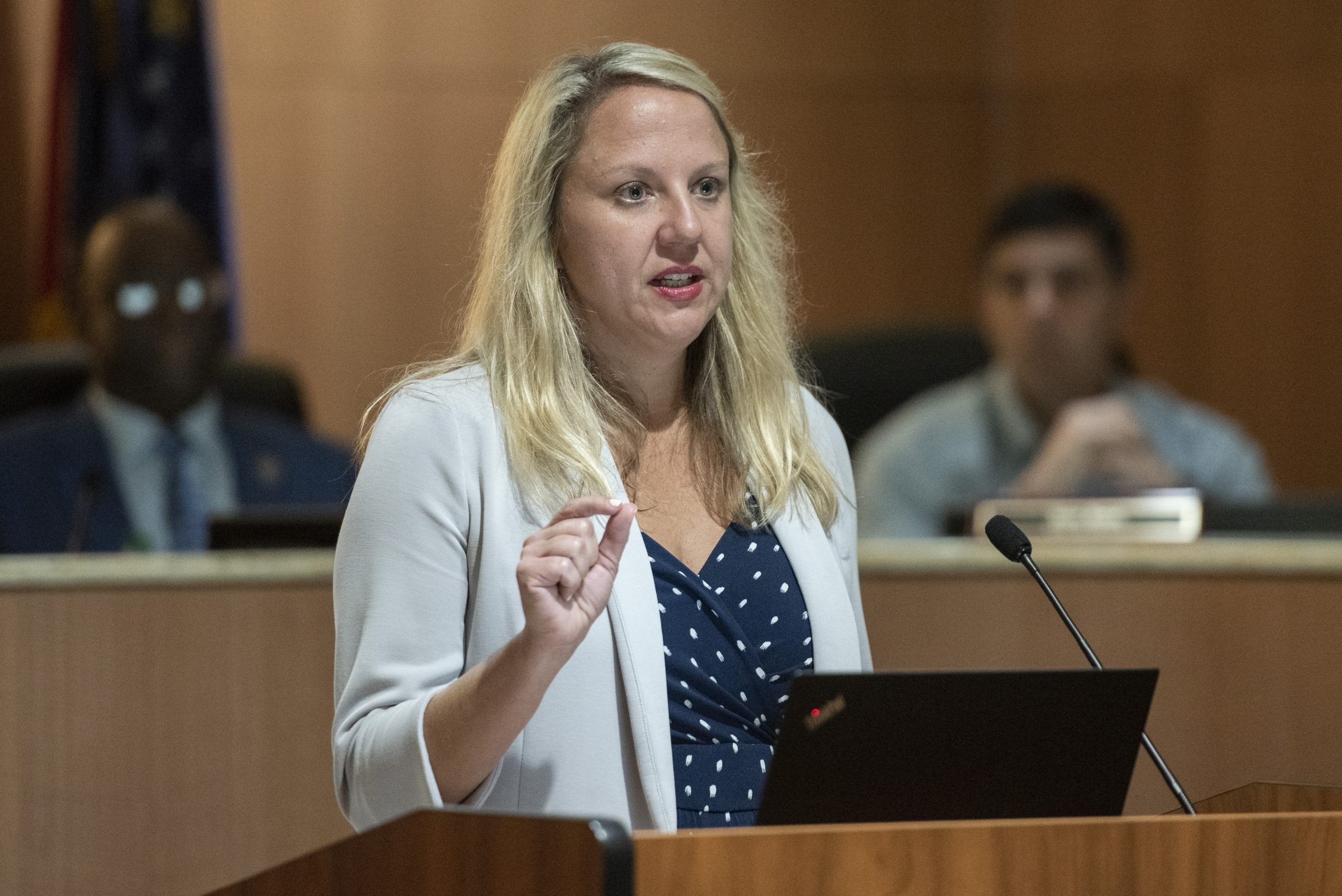Mississippi Today
St. Dominic and Singing River CEOs resign

The CEOs of two of the state's largest hospital systems are resigning.
Scott Kashman, head of St. Dominic Memorial Hospital in Jackson, and Tiffany Murdock, head of Singing River Health System on the Gulf Coast, have both announced they are leaving their positions.
According to spokespeople at both health systems, the CEOs' decisions were made on their own accord. Both systems are owned by Louisiana Catholic nonprofit Franciscan Missionaries of Our Lady Health System, which announced it was purchasing Singing River in March.
The departures continue a trend of hospital CEO turnover across the country. One study found that exits hit a four-year-high in January and attributed it to the tenuous state of health care across the country.
Mississippi is no exception — a third of rural hospitals are at risk of closure, according to one report. Three health systems in the state have recently announced sweeping layoffs.
Kashman, who has been CEO and market president of St. Dominic for a little less than two years, will be pursuing “an opportunity closer to family,” according to hospital marketing director Meredith Bailess.

Bailess did not answer whether Kashman's departure was related to the hospital's recent layoffs and the closure of its behavioral health services unit. She also declined to answer if there were any other changes on the executive level at St. Dominic.
“We are appreciative of Scott's commitment to the Jackson community and his leadership of our team through a difficult financial environment and the end of the COVID-19 pandemic,” Bailess said in an email. “We pray all the best for Scott and wish him well on his new endeavors.”
In his stead, Kristin Wolkart, chief nursing officer of the health system, will act as interim market president starting June 20.
Murdock was appointed as the leader of Singing River a year ago after serving in an interim position since last February. She was the first woman to hold the position.
“The Board of Trustees would like to thank Tiffany for her dedication, visionary leadership, and unparalleled commitment to the organization,” said Singing River's Board of Trustees President Erich Nichols in a press release issued Wednesday evening.
“Under her guidance, we have witnessed remarkable achievements and tremendous growth, setting new standards of excellence within our industry,” he continued. “Her approachability, humility, and genuine care for the team made her not just a CEO but a mentor and friend to many within the organization. We wish Tiffany the very best in her future endeavors.”
Spokespeople for Singing River could not be reached for further questions by press time.
Laurin St. Pe, current chief operating officer, has been appointed the interim CEO upon Murdock's departure, the exact date of which is unclear.
“We have full confidence in Laurin's ability to lead us through this transition period and maintain the positive momentum that has been built,” Nichols continued in the press release. “The Board of Trustees will work closely with Tiffany, Laurin, and the Executive Team to ensure the continuity of our operations, maintain our strategic focus, and uphold the values that define us as an organization.”
Singing River is one of the largest employers on the Gulf Coast, according to their website.
This article first appeared on Mississippi Today and is republished here under a Creative Commons license.
Mississippi Today
‘This doesn’t need to be a slap on the wrist,’ DA says of Noxubee County case
A capital murder investigation helped lead to unrelated federal charges against former Noxubee County Sheriff Terry Grassaree and his deputy that involved the sexual abuse of a jailed woman.
On Tuesday, Grassaree pleaded guilty to lying to the FBI when he denied receiving nude photos and videos from a woman locked in his jail. He faces up to five years in federal prison when he is sentenced Aug. 7.

His former deputy, Vance Phillips, pleaded guilty last year to bribery, which experts say could have been the perks the woman received, including a contraband cellphone. No date has been set for his sentencing.
District Attorney Scott Colom said Thursday he would like to see serious punishment for Grassaree for such abuse. “This doesn't need to be a slap on the wrist,” he said.
He said the discovery of this abuse began with a capital murder case. In 2015, Kristopher Haywood died in a convenience store attack in Macon when someone blasted the 28-year-old twice in the head with a shotgun.
A Noxubee County grand jury indicted Jonathan Shumaker, his girlfriend, Elizabeth Layne Reed, and Justin Williams and his brother, Joshua, on capital murder charges. Shumaker was also found in possession of a shotgun and charged with possession of a firearm by a felon. (These charges were dropped last year after an audio recording surfaced that exonerated them.)
But when Colom inherited the case as the new district attorney in 2016, he said he discovered the evidence and some of the witnesses contradicted the description of what happened.
Three years later, as he prepared for trial, he said his office interviewed Reed, who shared that deputies had been having sex with her inside the jail, “but you're not going to do anything about it.”
Colom promised that he would.
He said he reached out to federal authorities in 2019 for assistance out of concern that it might be difficult to investigate law enforcement in such a small county.
He said his office took the lead. One of his workers messaged Deputy Phillips from Reed's Facebook page a photograph of a positive test for pregnancy.
“That's how we got Vance to corroborate that Reed was telling the truth about the unlawful sex,” Colom said. “We knew we had a serious problem then.”
Any sex that an officer has with someone behind bars is a felony under Mississippi law and carries up to five years in prison. The maximum penalty under federal law is also five years.
There is no way for those behind bars to give consent, Colom said. “They're in a vulnerable situation. Their liberty and freedom can be used against them.”
Reed told Colom's office that the sex began with Phillips after he began transporting her to doctors' visits. He first took her to his trailer to have sex and then had sex with her while the female correctional officers were at lunch, Colom said.
The encounters also took place in deputies' offices, the interrogation room and even the evidence shed, he said.
The deputy continued to demand sex with her on an almost weekly basis between May 2017 and October 2019, according to a lawsuit she filed against Noxubee County and the sheriff's office. “Reed, under the coercion of Phillips' authority and her incarceration, acquiesced in Phillips' demands.”
Another deputy, Damon Clark, who gave her cigarettes and a touchscreen cell phone, took her up front to a shower, where “he laid me on the floor [and] got on top of me,” she told authorities.
Clark has never been charged. “I never coerced Reed into sex,” he wrote in his response to the lawsuit, but he never answered whether he had sex with her.
Reed told authorities that one other deputy digitally penetrated her and another groped her and “sexted” her.
Colom said their investigation into sexual abuse corroborated much of what Reed alleged. It was then, he said, “we realized we had a serious problem with the Noxubee County Sheriff's Office under the regime of former Sheriff Terry Grassaree.”
Their investigation showed Grassaree knew about his deputies' activities, but rather than referring the matter to authorities, he sought to “get in on the action himself,” Colom said.
Reed's lawsuit said Grassaree demanded “a continuous stream of explicit videos, photographs and texts” from her in jail. She also alleged in the lawsuit that Grassaree touched her in a “sexual manner.”
The county settled the lawsuit for an undisclosed amount.
Colom said he decided to turn over his investigation to federal authorities with the agreement they would prosecute since they could pull far more potential jurors. Getting enough people to serve as jurors has long been a problem in Noxubee County, which has a population of less than 10,000, much less finding impartial jurors, he said.
On July 13, 2020, an FBI agent interviewed Grassaree, who denied that he received nude photos and videos from Reed in jail.
Two years later, reporters from the Mississippi Center for Investigative Reporting at Mississippi Today and The New York Times began asking Colom about the case. Colom responded that he was waiting for federal authorities to prosecute as they agreed. Afterward, he contacted federal authorities again and told them reporters had reached out to him, asking questions.
In October 2022, a federal grand jury finally indicted Grassaree and Phillips.
Colom said federal authorities “never gave me a good reason for why they took so long.”
He said even more troubling in his investigation was the discovery of “illegal activities” by the sheriff's office “that were unrelated to sex.” There have been no indictments in that case.
Noxubee County residents already have a lot of skepticism toward law enforcement, he said, “so when you actually do have corruption, it has to be aggressively handled. We can't have police forces where the people we are trusting to protect and serve are only concerned about themselves and their own illegal agendas.”
He still hopes federal authorities will prosecute, he said. “It would send a strong message to the citizens in Noxubee County that you care about them.”
Asked if his office could bring state charges now, he said that was impossible because “the statute of limitations has run.”
Federal authorities have a five-year statute of limitations, but the statute of limitations in Mississippi is only two years.
Colom said he didn't move sooner because federal officials “had agreed to prosecute the charges and kept telling me they were going to do something.”
A spokesperson for the U.S. Attorney's office in Jackson responded Thursday, “The Department of Justice follows the facts, law, and principles of federal prosecution when determining how to proceed in an investigation and what charges, if any, can be filed. Federal agents and prosecutors will continue working hard every day to hold public officials in Mississippi, like Sheriff Grassaree, accountable for corrupt use of their office and efforts to mislead investigators.”

Former U.S. Attorney Michael Hurst, who served from 2017 to 2021, said prosecuting public corruption was one of his top priorities, especially when it involved law enforcement who “violated their oath and victimized our citizens.”
He said if the U.S. attorney's office had sufficient evidence beyond a reasonable doubt to prosecute, “we prosecuted them, no matter who they were, period. In many instances, federal prosecutors are the last line of defense in our society of ensuring that our citizens are protected, their rights are upheld, and that criminals — especially corrupt public officials — are held accountable.”
This article first appeared on Mississippi Today and is republished here under a Creative Commons license.
Mississippi Today
Medical residents are increasingly avoiding states with abortion restrictions
Isabella Rosario Blum was wrapping up medical school and considering residency programs to become a family practice physician when she got some frank advice: If she wanted to be trained to provide abortions, she shouldn't stay in Arizona.
Blum turned to programs mostly in states where abortion access — and, by extension, abortion training — is likely to remain protected, like California, Colorado, and New Mexico. Arizona has enacted a law banning most abortions after 15 weeks.
“I would really like to have all the training possible,” she said, “so of course that would have still been a limitation.”
In June, she will start her residency at Swedish Cherry Hill hospital in Seattle.
According to new statistics from the Association of American Medical Colleges, for the second year in a row, students graduating from U.S. medical schools were less likely to apply this year for residency positions in states with abortion bans and other significant abortion restrictions.
Since the Supreme Court in 2022 overturned the constitutional right to an abortion, state fights over abortion access have created plenty of uncertainty for pregnant patients and their doctors. But that uncertainty has also bled into the world of medical education, forcing some new doctors to factor state abortion laws into their decisions about where to begin their careers.
Fourteen states, primarily in the Midwest and South, have banned nearly all abortions. The new analysis by the AAMC — a preliminary copy of which was exclusively reviewed by KFF Health News before its public release — found that the number of applicants to residency programs in states with near-total abortion bans declined by 4.2%, compared with a 0.6% drop in states where abortion remains legal.
Notably, the AAMC's findings illuminate the broader problems abortion bans can create for a state's medical community, particularly in an era of provider shortages: The organization tracked a larger decrease in interest in residencies in states with abortion restrictions not only among those in specialties most likely to treat pregnant patients, like OB-GYNs and emergency room doctors, but also among aspiring doctors in other specialties.
“It should be concerning for states with severe restrictions on reproductive rights that so many new physicians — across specialties — are choosing to apply to other states for training instead,” wrote Atul Grover, executive director of the AAMC's Research and Action Institute.
The AAMC analysis found the number of applicants to OB-GYN residency programs in abortion ban states dropped by 6.7%, compared with a 0.4% increase in states where abortion remains legal. For internal medicine, the drop observed in abortion ban states was over five times as much as in states where abortion is legal.
In its analysis, the AAMC said an ongoing decline in interest in ban states among new doctors ultimately “may negatively affect access to care in those states.”
Jack Resneck Jr., immediate past president of the American Medical Association, said the data demonstrates yet another consequence of the post-Roe v. Wade era.
The AAMC analysis notes that even in states with abortion bans, residency programs are filling their positions — mostly because there are more graduating medical students in the U.S. and abroad than there are residency slots.
Still, Resneck said, “we're extraordinarily worried.” For example, physicians without adequate abortion training may not be able to manage miscarriages, ectopic pregnancies, or potential complications such as infection or hemorrhaging that could stem from pregnancy loss.
Those who work with students and residents say their observations support the AAMC's findings. “People don't want to go to a place where evidence-based practice and human rights in general are curtailed,” said Beverly Gray, an associate professor of obstetrics and gynecology at Duke University School of Medicine.
Abortion in North Carolina is banned in nearly all cases after 12 weeks. Women who experience unexpected complications or discover their baby has potentially fatal birth defects later in pregnancy may not be able to receive care there.
Gray said she worries that even though Duke is a highly sought training destination for medical residents, the abortion ban “impacts whether we have the best and brightest coming to North Carolina.”
Rohini Kousalya Siva will start her obstetrics and gynecology residency at MedStar Washington Hospital Center in Washington, D.C., this year. She said she did not consider programs in states that have banned or severely restricted abortion, applying instead to programs in Maryland, New Hampshire, New York, and Washington, D.C.
“We're physicians,” said Kousalya Siva, who attended medical school in Virginia and was previously president of the American Medical Student Association. “We're supposed to be giving the best evidence-based care to our patients, and we can't do that if we haven't been given abortion training.”
Another consideration: Most graduating medical students are in their 20s, “the age when people are starting to think about putting down roots and starting families,” said Gray, who added that she is noticing many more students ask about politics during their residency interviews.
And because most young doctors make their careers in the state where they do their residencies, “people don't feel safe potentially having their own pregnancies living in those states” with severe restrictions, said Debra Stulberg, chair of the Department of Family Medicine at the University of Chicago.
Stulberg and others worry that this self-selection away from states with abortion restrictions will exacerbate the shortages of physicians in rural and underserved areas.
“The geographic misalignment between where the needs are and where people are choosing to go is really problematic,” she said. “We don't need people further concentrating in urban areas where there's already good access.”
After attending medical school in Tennessee, which has adopted one of the most sweeping abortion bans in the nation, Hannah Light-Olson will start her OB-GYN residency at the University of California-San Francisco this summer.
It was not an easy decision, she said. “I feel some guilt and sadness leaving a situation where I feel like I could be of some help,” she said. “I feel deeply indebted to the program that trained me, and to the patients of Tennessee.”
Light-Olson said some of her fellow students applied to programs in abortion ban states “because they think we need pro-choice providers in restrictive states now more than ever.” In fact, she said, she also applied to programs in ban states when she was confident the program had a way to provide abortion training.
“I felt like there was no perfect, 100% guarantee; we've seen how fast things can change,” she said. “I don't feel particularly confident that California and New York aren't going to be under threat, too.”
As a condition of a scholarship she received for medical school, Blum said, she will have to return to Arizona to practice, and it is unclear what abortion access will look like then. But she is worried about long-term impacts.
“Residents, if they can't get the training in the state, then they're probably less likely to settle down and work in the state as well,” she said.
KFF Health News is a national newsroom that produces in-depth journalism about health issues and is one of the core operating programs at KFF—an independent source of health policy research, polling, and journalism. Learn more about KFF.
This article first appeared on Mississippi Today and is republished here under a Creative Commons license.
Mississippi Today
On this day in 1928
MAY 9, 1928

Burl Toler was born in Memphis. The first Black official in any major sport in the U.S., he defeated prejudice at each turn.
In 1951, Toler starred for the legendary undefeated University of San Francisco Dons. Prejudice kept the integrated team from playing in the Gator Bowl, but the team found success anyway. Nine players went to the NFL, three of them later inducted into the Professional Football Hall of Fame. Their best player may have been Toler, who was drafted by Cleveland but suffered a severe knee injury in a college all-star game that ended his playing days.
Toler decided to make his way into professional football through officiating. The NFL hired him in 1965 — a year before Emmett Ashford became the first Black umpire in Major League Baseball and three years before Jackie White broke the color barrier in the NBA.
He rose above the racism he encountered, working as a head linesman and field judge for a quarter-century. He officiated Super Bowl XIV, where the Pittsburgh Steelers defeated the Los Angeles Rams in 1980. Two years later, he officiated the “Freezer Bowl,” where the Cincinnati Bengals defeated the San Diego Chargers in the AFC Championship Game. The game marked the coldest temperatures of any game in NFL history — minus 59 degrees wind chill — and Toler suffered frostbite.
In addition to his NFL work, he worked as an educator, becoming the first Black secondary school principal in the San Francisco district. He died in 2009. Two area schools and a hall on the University of San Francisco campus have been renamed in his honor. On Nov. 23, 2020, Toler was remembered again when the NFL had its first all-Black officiating crew.
This article first appeared on Mississippi Today and is republished here under a Creative Commons license.
-
SuperTalk FM6 days ago
State approves $160M to expand Highway 7 to four lanes in Lafayette County
-
SuperTalk FM3 days ago
Legislation outlawing ‘squatted’ vehicles in Mississippi signed into law
-
Mississippi Today4 days ago
On this day in 1917
-
228Sports2 days ago
PRC’s Bats Come Alive Late As Blue Devils Beat Picayune To Advance To 6A South State Title Series
-
Mississippi News4 days ago
LCSO wants people aware of a scam circling the area
-
SuperTalk FM22 hours ago
Mississippi governor approves bill allowing electronic search warrants
-
Mississippi News4 days ago
Winston Co. Sheriff’s Office investigates shooting at Dave’s Club
-
Mississippi News2 days ago
Strong storms late Wednesday night – Home – WCBI TV









































